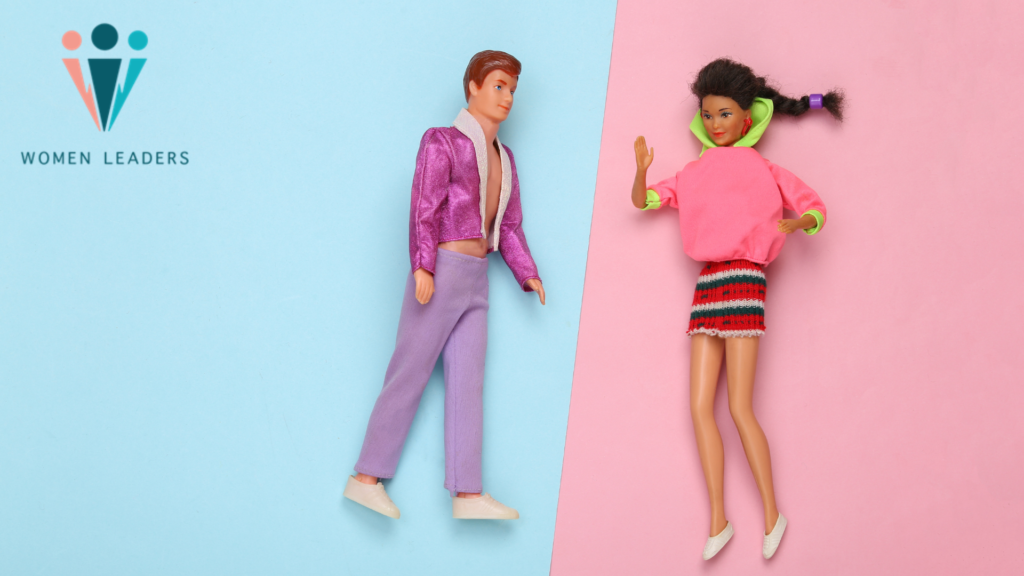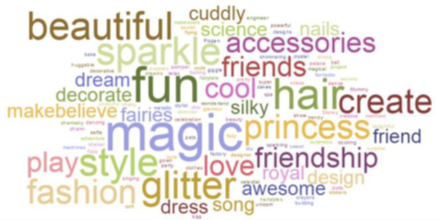
Barbie is a Feminist Bimbo!
(and why we need to pay more attention to gender stereotyping)
Barbie as the Ultimate ‘Girl boss’ (Spoiler alert!)
Barbie opens with a parody of 2001: A Space Odyssey. showing a group of little girls roleplaying motherhood with baby dolls (and looking none too thrilled about it.) The sudden appearance of a giant Barbie doll heralds the liberation of the girls into the feminist utopia of Barbieland, where ‘Stereotypical Barbie’ lives with female high achievers in all professions, and where male ‘Kens’ are sidelined. When challenges from the real world creep in (triggering a reaction of horror, for example, when Barbie’s permanently arched feet drop to normal) she visits the real world and is disturbed to find herself objectified and sexually harassed. Ken, meanwhile is delighted at the discovery of patriarchy, and there are some very clever digs at the manosphere, as well as offering insights into how incels are created. Teenager Sasha enlightens Barbie about the way her perfect (and unnatural) body image has a negative impact on women’s self-esteem, and when they discover that the Kens have taken over Barbieworld and brainwashed the
other Barbies into subservient roles, a rescue mission is launched.
The hugely entertaining film subverts your expectations of a film about Mattel, Inc.’s ‘professional bimbo’ doll. And it’s perhaps worth noting that in her 60+ years of existence, Barbie has held over 200 jobs including being a surgeon, a computer programmer, running for President of the US, and being an astronaut even before the moon landings.
The Persistence of Gender Stereotypes
In our real world, gender stereotyping is sadly ubiquitous. The perception that women are ‘naturally’ more caring has been comprehensively debunked by the scientific evidence (as Gina Rippon, Angela Saini, and Caroline Criado Perezhave all demonstrated in their very readable books). Worryingly, stereotyping begins even before birth, with ‘gender-reveal’ parties, and throughout childhood, children are bombarded with gendered roles. You don’t have to go any further than the shopping centre to see and understand the problem.
Consider these two worldclouds, which show the most often used in TV toy advertising (courtesy of the excellent campaign Let Toys Be Toys):


I don’t even need to explain which is which. Children’s clothes reflect the same messages, with girls being far less suitable for playing football in the playground than boys, and with messages that reinforce the stereotypical perception of girls as kind and gentle, with hero messaging saved for the boys. And if, like me, you hoped that the Thomas the Tank Engine type of sidelining of females was a thing of the past, take a look at the characters in Paw Patrol!
Why does this matter?
Because all children need to escape the gendered assumptions that my generation grew up with; when girls did domestic science and boys did metalwork, doctors were male and nurses were female, firefighters were firemen and police officers were policemen. It’s not just ‘PC’ or ‘woke’ to use gender-neutral terms for job roles – we need to become more aware of the subliminal messaging in our environment and media. Micro-discriminations of all kinds reinforce inequalities in the status quo. Gendered expectations limit the potential for both girls and boys, with gender stereotypes contributing to mental health problems, including low self-esteem, anxiety about body image, eating disorders, higher male suicide rates, and violence against women and girls. As well as the importance of encouraging girls into STEM subjects, we also need to encourage more men into caring roles, especially early years and education.
Gender Equity, Not Gender Equality
Why am I using the term gender equity and not gender equality?
Because more effort is needed to challenge the stereotypical assumptions that children inherit from their parents. Having equal access isn’t enough, there needs to be more proactive efforts to combat the damaging stereotypical depictions that limit female ambition. The inspirational Lionesses are doing a fabulous job of reclaiming football for women and girls, and there is an encouraging rise in female representation on FTSE boards, but there is a long way to go, in politics, business, and the home.
In the context of rising levels of gender dysphoria in teenagers, gender stereotyping is insidious, preventing a way of being that is free from the control of gendered ‘rules’ and expectations. If a boy loves sparkly accessories and dressing up, or a girl wants to climb trees and drive dumper trucks, that shouldn’t raise an eyebrow, but even when early years professionals are careful to encourage gender neutrality in their provision, children often ‘police’ gender role themselves, inheriting gendered assumptions from their parents and the media, and we all know that children need to feel that they ‘belong’ in their peer group.
So we need to be more proactive to combat social norms. It’s not just about encouraging women into rewarding careers, but about giving men the opportunity and encouragement to choose non-stereotypical roles and to take an equal share of parenting responsibilities.
The mentoring and allyship work being done by Women Leaders is providing valuable support for women in the workplace, and men need to be as involved as women. Men and boys should certainly go and see the Barbie movie. She might be a bimbo, but she’s a feminist bimbo, in a very clever and thought-provoking film that everyone can enjoy.
Zoe Raven – CEO Acorn Early Years and Women Leaders Trustee


